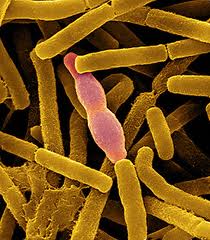Bacteria colonise environments by forming biofilms, which are extremely resistant to conventional antibiotics. For this reason biofilms are the cause of many infections, particularly where there are device-related infections, infections on body surfaces and in chronic infections. Currently, many known antibiotics are losing their effectiveness and are thus unable to overcome and control these bacteria. Adding to the major concerns being expressed by physicians and medical authorities. Therefore there is an urgent need for new strategies to treat biofilm infections. Using prior knowledge this study showed that small positively charged synthetic peptides can stop biofilm formation in many antibiotic-resistant bacterial pathogens, such as Staphylococcus aureus, Escherichia coli, and Salmonella. When they performed a screening assay of small peptides, they found a candidate that acts on an important stress pathway. Bacteria use the pathway to synthesize the signaling nucleotide ppGpp. Without ppGpp, the bacteria have trouble forming biofilms and even staying alive. The candidate, peptide 1018, binds directly to ppGpp and degrades it, stopping deadly pathogens in their tracks. Thus presenting a strategy for new agents that specifically target bacterial biofilms.












